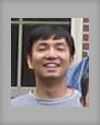Alumni

Bio
Thomas was born in People’s Republic of China in 1975. He spent four of his teenage years on the island of Guadalcanal in Solomon Islands. After completion of his high school diploma from Solomon Islands, he attended University of Texas at Austin and obtained a Bachelor of Science degree in Electrical Engineering in 1998. He is currently a graduate student in the Electrical and Computer Engineering department from University of California, San Diego. His research interests are in neural networks, machine learning, and game theories. He is currently working on a Chinese/Japanese speech-to-text transcription system based on a new thalama-cortical theory in neuroscience. One of his long-term goals is to produce a computer GO program that can compete at a professional level. Furthermore, he competed in the 2001 AI-Challenge and his associative memory algorithm achieved top-10 standings in 4 of the 7 contests. At the summer school Thomas demonstrated that both a Fourier and a Walsh transform can be computed by using a combination of additive and reversible Cellular Automata. He intends to generalize this procedure to all Discrete Orthogonal Transforms. In addition, he is currently a senior engineer in Qualcomm Inc. His professional interests are in creating intelligent human-to-machine application softwares in wireless mobile devices, e.g. speech-to-text short messaging service, etc. He likes to surf, snowboard, golf, play tennis and basketball. He also wants to visit 100 countries before he turns 50.
Project: Studies on Discrete Orthogonal Transform Using Cellular Automata
This project is the author’s first experimentation with a simple rule-based system to emulate a Discrete Orthogonal Transform (DOT). The significance of this study lies in the author’s belief that complexities can be manipulated by using the right set of transformations. Based on the Fast Fourier Transform (FFT) algorithm, the author postulated two primitive operatives in any DOT: they are pair-wise addition/subtraction and shuffling operations. The plan for future studies is to enlarge the search scope and identify other primitive operators for general DOT’s.
Favorite Three-Color Cellular Automaton
Rule Chosen: 1212312

Additional Information
Zheng, T. “Discrete Orthogonal Transforms Using Cellular Automata.” Presentation at NKS 2004, Boston, MA, 2004. [abstract] [materials]